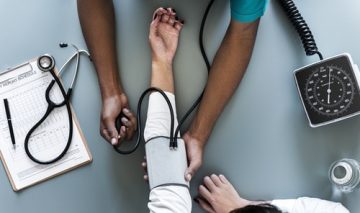2016, reported an 11.2% increase in LGBT members coming out and embracing their identity and sexuality. Lesbians and bisexual women account for 2% of the population in the UK. Although, as the community continues to grow, the medical sector deprioritises LGBT needs disregarding sexuality as an affect to overall health.
The needs of women who have sex with women are rarely recognised or specifically focused on in general approaches aimed at lesbian, gay, bisexual and trans communities. The absence of appropriate services catered to their well-being and sexual health may emphasis the inequality experienced in the medical sector. Evidence shows that women who have sex with women face additional barriers in accessing services and therefore consideration of their needs is important.
To understand the dynamics of women’s sexual identity: women who have sex with women (WSW), lesbian, bisexual women and sexual minority women will be used to refer to the spectrum of orientation among women.

Lesbian and bisexual women experience inequalities in relation to mental health, reproductive health issues, domestic violence and health risk behaviours such as smoking and alcohol consumption. Most sexual minority women will refrain from sexual health services to avoid negative reactions from their doctors. LGBT+ patients are 50% more likely to report a negative experience with health services than heterosexuals. Considering the lack of information available on lesbian and bisexual health, some women may also avoid visiting their GP if specific services are not offered or doctors are ignorant to lesbian and bisexual women’s needs.
Professor Catherine Meads, lead researcher for the 2018 National Sexual Wellbeing Survey for women who have sex with women says:
“The health of minority groups should not be assumed to be the same as the majority of a group.”
Evidence from an analysis of the England GP Patient Survey showed higher rates of musculoskeletal health issues, asthma and respiratory conditions and some types of cancer more commonly found in sexual minority women compared to heterosexual women.
Professor Meads discusses her research and the obstacles she has faced while collecting information on sexual minority women’s health. Most of the information used in studies related to WSW is limited and must be compared to various sources. Using cross sectional surveys from the US, revealed higher rates of asthma and cardio vascular disease in lesbians. However, diagnosis on increasing rates, is unknown.
 Governments such as the US are no longer collecting or publishing information on major research projects like Professor Mead’s. Meanwhile, Europe and the UK feel it is mandatory to pose orientation questions into large government funded research studies related to LGBT communities. “They’re going in opposite directions. There’s no way to compare the data and develop answers from them” says Professor Meads, who believes that higher mortality rates among sexual minority women is due to difficulty accessing health care services and health insurance. This impacts the well-being of sexual minority women and the accuracy of the information that they rely on.
Governments such as the US are no longer collecting or publishing information on major research projects like Professor Mead’s. Meanwhile, Europe and the UK feel it is mandatory to pose orientation questions into large government funded research studies related to LGBT communities. “They’re going in opposite directions. There’s no way to compare the data and develop answers from them” says Professor Meads, who believes that higher mortality rates among sexual minority women is due to difficulty accessing health care services and health insurance. This impacts the well-being of sexual minority women and the accuracy of the information that they rely on.
Based on a study about appropriate counselling for WSW showed lesbians are less likely to get counselling on birth control prescriptions. Surprisingly, only 24% of lesbians reported being counselled about condom use at an STD screening compared with 49% of heterosexual women.
The Space Youth Project support group leader, Rachel Fisher, has been supporting LGBT teens as young as 12 years old. “Some people wonder why LGBT communities need separate health services…Staff need to be knowledgeable about the different situations that LGBT members can find themselves in. Domestic violence between two women looks completely different from domestic violence between a heterosexual couple.”
The Stonewall Survey, Unhealthy attitudes, revealed six in ten health practitioners who are directly responsible for patient care, do not consider sexual orientation to be relevant to your health needs. Although, one in ten health professionals are not confident in their understanding of lesbian, bisexual and gay needs and even more so for trans patients.
The Equality network in Dorset submitted a report to respond to a 5 year planned NHS mental health care strategy. The document does not include any mention of sexual and gender minorities. Concern and involvement towards LGB&T wellbeing services exists a “silo and tick box approach to both minor and major needs and issues” according to the report.
Alan Mercel-Sanca LGB&T Dorset Equality Network founder and Lead Officer has been an equality consultant commissioned by NHS organisation. He claims that those in the NHS who are aware of the issues around the medical sector and LGBT community but do nothing about it are looking at the situation through “indirect homophobic and transphobic angles.”
The English GP patient study found that LGBT patients, self-reported ‘fair or poor’ health status was 24.9% and 31.6% in lesbian and bisexual women respectively compared to 20.5% in heterosexual women.
As a response to the lack of engagement and attention to data, the report suggests strengthening communication lines between NHS middle and upper management with the LGBT community and associated organizations. Monitoring on service performance especially customer care, training and communication between patient and professional is essential.
Mental health is the most popular issues within the community. Ethnic sexual minority women are more likely to be involved with men due to cultural norms, fear of discrimination, prejudice and internalised sexuality phobias which are contributing factors to avoiding health services. Alan Mercel-Sanca explains “Biphobia within the LGB community is a popular phenomenon.” Discrimination in society and community is impactful on bisexual women’s health.
Individuals and organisations that were interviewed for this project could not provide reliable information specific to women’s sexual health and well-being. With little information on the subject, concerns over WSW health is never focused on but hidden within the entire community. While the medical sector is still in the early stages of understanding LGBT needs, accessing information on safe sex and providing a safe comfortable space to address mental health should be available. Specifically, LGBT inclusive counselling, involved with trained community staff experienced with mental health issues caused by abuse, discrimination, prejudice and internalised phobias should be prioritised.
The term “LGBT” is often used to regard a community of individuals based on their sexuality or identity. I spoke with Anna-Jayne Metcalfe about her views on the medical gap and what LGBT represents. Alexis Alley reports…

